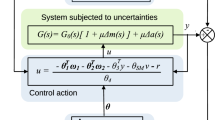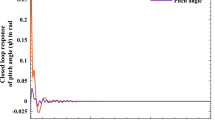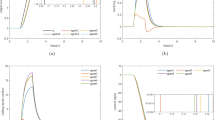Abstract
This paper develops a fault tolerant control (FTC) approach for quadrotor aerial vehicles under different types of actuator faults. An observer-based fault detection and diagnosis mechanism is devised to estimate the faults. A robust finite-time convergent controller which merges the features of Backstepping, and Integral Nonsingular Fast Terminal Sliding surface is proposed to ensure the finite time stability of the states in nominal conditions and their asymptotic stability in faulty conditions. A control redistribution method is formulated to maintain the quadrotor in flight, in the case of complete actuator failure and lock in place (LIP) faults. The proposed controller was assessed in the presence of loss of actuator effectiveness (LOE) faults, complete damage of one rotor and LIP faults. The obtained results confirmed the ability of the proposed approach to enable the quadrotor to track the commanded trajectory precisely under partial LOE faults and continue tracking with an expected performance degradation under the effect of complete motor failure and LIP faults.
Similar content being viewed by others
References
N. Mohamed, J. Al-Jaroodi, I. Jawhar, A. Idries, and F. Mohammed, “Unmanned aerial vehicles applications in future smart cities,” Technological Forecasting and Social Change, vol. 153, 119293, 2020.
K. Valavanis, “Special issue on unmanned aerial vehicles (UAVs),” Control Theory and Technology, vol. 16, no. 2, pp. 81–81, 2018.
F. Nan, S. Sun, P. Foehn and D. Scaramuzza, “Nonlinear MPC for quadrotor fault-tolerant control,” IEEE Robotics and Automation Letters, vol. 7, no. 2, pp. 5047–5054, April 2022.
B. Wang and Y. Zhang, “An adaptive fault-tolerant sliding mode control allocation scheme for multirotor helicopter subject to simultaneous actuator faults,” IEEE Transactions on Industrial Electronics, vol. 65, no. 5, pp. 4227–4236, May 2018.
H. Yang, Y. Jiang, and S. Yin, “Fault-tolerant control of time-delay Markov jump systems with Itô stochastic process and output disturbance Based on sliding mode observer,” IEEE Transactions on Industrial Informatics, vol. 14, no. 12, pp. 5299–5307, December 2018.
B. Xiao, S. Yin, and H. Gao, “Reconfigurable tolerant control of uncertain mechanical systems with actuator faults: A sliding mode observer-based approach,” IEEE Transactions on Control Systems Technology, vol. 26, no. 4, pp. 1249–1258, July 2018.
B. Li, W. Gong, Y. Yang, B. Xiao, and D. Ran, “Appointed fixed time observer-based sliding mode control for a quadrotor UAV under external disturbances,” IEEE Transactions on Aerospace and Electronic Systems, vol. 58, no. 1, pp. 290–303, February 2022
K. Liu and R. Wang, “Antisaturation Adaptive Fixed-Time Sliding Mode Controller Design to Achieve Faster Convergence Rate and Its Application,” IEEE Transactions on Circuits and Systems II: Express Briefs, vol. 69, no. 8, pp. 3555–3559, August 2022.
J. Xiong, J. Pan, G. Chen, X. Zhang, and F. Ding, “Sliding mode dual-channel disturbance rejection attitude control for a quadrotor,” IEEE Transactions on Industrial Electronics, vol. 69, no. 10, pp. 10489–10499, October 2022.
M. Labbadi, Y. Boukal, and M. Cherkaoui, “Advanced robust nonlinear control approaches for quadrotor unmanned aerial vehicle: Roadmap to improve tracking-trajectory performance in the presence of external disturbances,” Springer Nature, vol. 384, 2021.
G. Xu, Y. Xia, D. Zhai, and B. Cui, “Adaptive sliding mode disturbance observer-based funnel trajectory tracking control of quadrotor with external disturbances,” IET Control Theory & Applications, vol. 15, no. 13, pp. 1778–1788, 2021.
J. Xiong and G. Zhang, “Global fast dynamic terminal sliding mode control for a quadrotor UAV,” ISA Transactions, vol. 66, pp. 233–240, 2017.
X. Yu, Y. Feng, and Z. Man, “Terminal sliding mode control - An overview,” IEEE Open Journal of the Industrial Electronics Society, vol. 2, pp. 36–52, 2021.
B. Mu, Y. Pei, and Y. Shi, “Integral sliding mode control for a quadrotor in the presence of model uncertainties and external disturbances,” Proc. of American Control Conference, pp. 5818–5823, 2017.
Z. Hou, X. Yu, and P. Lu, “Terminal sliding mode control for quadrotors with chattering reduction and disturbances estimator: Theory and application,” Journal of Intelligent & Robotic Systems, vol. 105, no. 4, 2022.
A. Modirrousta and M. Khodabandeh, “Adaptive non-singular terminal sliding mode controller: New design for full control of the quadrotor with external disturbances,” Transactions of the Institute of Measurement and Control, vol. 39, no. 3, pp. 371–383, 2016.
Y. Niu, H. Ban, H. Zhang, W. Gong, and F. Yu, “Nonsingular terminal sliding mode based finite-time dynamic surface control for a quadrotor UAV,” Algorithms, vol. 14, no. 11, 315, 2021.
U. Ansari, A. Bajodah, and M. Hamayun, “Quadrotor control via robust generalized dynamic inversion and adaptive non-singular terminal sliding mode,” Asian Journal of Control, vol. 21, no. 3, pp. 1237–1249, 2018.
P. Tang, F. Zhang, J. Ye, and D. Lin, “An integral TSMC-based adaptive fault-tolerant control for quadrotor with external disturbances and parametric uncertainties,” Aerospace Science and Technology, vol. 109, 106415, 2021.
A. Najafi, M. Vu, S. Mobayen, J. Asad, and A. Fekih, “Adaptive barrier fast terminal sliding mode actuator fault tolerant control approach for quadrotor UAVs,” Mathematics, vol. 10, no. 16, 3009, 2022.
Y. Tang and R. Patton, “Reconfigurable fault tolerant control for nonlinear aircraft based on concurrent SMC-NN adaptor,” Proc. of the American Control Conference, pp. 1267–1272, Portland, OR, 2014.
N. P. Nguyen, W. Kim, and J. Moon, “Observer-based super-twisting sliding mode control with fuzzy variable gains and its application to overactuated quadrotors,” Proc. of the IEEE Conference on Decision and Control, pp. 5993–5998, Miami Beach, FL, 2018.
S. Mallavalli and A. Fekih, “A fault tolerant tracking control for a quadrotor UAV subject to simultaneous actuator faults and exogenous disturbances,” International Journal of Control, vol. 93, no. 3, pp. 655–668, March 2020
B. Gao, Y. Liu, and L. Liu, “Adaptive neural fault-tolerant control of a quadrotor UAV via fast terminal sliding mode,” Aerospace Science and Technology, vol. 129, 107818, 2022.
S. Han, Q. Zhong, L. Cui, K. Shi, X. Cai, and O. Kwon, “Extended dissipativity analysis for T-S fuzzy systems based on reliable memory control and aperiodic sampled-data method,” Journal of the Franklin Institute, vol. 359, no. 5, pp. 2156–2175, 2022.
F. Chen, W. Lei, K. Zhang, G. Tao, and B. Jiang, “A novel nonlinear resilient control for a quadrotor UAV via back-stepping control and nonlinear disturbance observer,” Nonlinear Dynamics, vol. 85, no. 2, pp. 1281–1295, 2016.
Z. Jin, G. Meng, and L. Wang, “Backstepping based trajectory tracking control for a quadrotor aircraft with nonlinear disturbance observer,” International Journal of Control and Automation, vol. 8, no. 11, pp. 169–182, 2015.
H. Lu, C. Liu, M. Coombes, L. Guo, and W. Chen, “Online optimisation-based backstepping control design with application to quadrotor,” IET Control Theory & Applications, vol. 10, no. 14, pp. 1601–1611, 2016.
M. M. Basri, A. Husain, and K. Danapalasingam, “Intelligent adaptive backstepping control for MIMO uncertain non-linear quadrotor helicopter systems,” Transactions of the Institute of Measurement and Control, vol. 37, no. 3, pp. 345–361, 2014.
F. Chen, R. Jiang, K. Zhang, B. Jiang, and G. Tao, “Robust backstepping sliding-mode control and observer-based fault estimation for a quadrotor UAV,” IEEE Transactions on Industrial Electronics, vol. 63, no. 8, pp. 5044–5056, August 2016.
S. Zeghlache, A. Djerioui, L. Benyettou, T. Benslimane, H. Mekki, and A. Bouguerra, “Fault tolerant control for modified quadrotor via adaptive type-2 fuzzy backstepping subject to actuator faults,” ISA Transactions, vol. 95, pp. 330–345, 2019.
N. Nguyen and S. Hong, “Active fault-tolerant control of a quadcopter against time-varying actuator faults and saturations using sliding mode backstepping approach,” Applied Sciences, vol. 9, no. 19, 4010, 2019.
A. Merheb, H. Noura, and F. Bateman, “Emergency control of AR drone quadrotor UAV suffering a total loss of one rotor,” IEEE/ASME Transactions on Mechatronics, vol. 22, no. 2, pp. 961–971, April 2017.
A. Lanzon, A. Freddi, and S. Longhi, “Flight control of a quadrotor vehicle subsequent to a rotor failure,” Journal of Guidance, Control, and Dynamics, vol. 37, no. 2, pp. 580–591, 2014.
A. Freddi, A. Lanzon, and S. Longhi, “A feedback linearization approach to fault tolerance in quadrotor vehicles,” IFAC Proceedings Volumes, vol. 44, pp. 5413–5418, January 2011.
J. Stephan, L. Schmitt, and W. Fichter, “Linear parameter-varying control for quadrotors in case of complete actuator loss,” Journal of Guidance, Control, and Dynamics, vol. 41, no. 10, pp. 2232–2246, 2018.
R. Falcón, H. Ríos, A. Dzul, “A sliding-mode-based active fault-tolerant control for robust trajectory tracking in quad-rotors under a rotor failure,” International Journal of Robust and Nonlinear Control, vol. 32, no. 15, pp. 8451–8469, 2022.
V. Lippiello, F. Ruggiero, and D. Serra, “Emergency landing for a quadrotor in case of a propeller failure: A PID based approach,” Proc. of the IEEE International Symposium on Safety, Security, and Rescue Robotics, pp. 1–7, Hokkaido, 2014.
P. Lu and E. Kampen, “Active fault-tolerant control for quadrotors subjected to a complete rotor failure,” Proc. of the International Conference on Intelligent Robots and Systems, pp. 4698–4703, Hamburg, 2015.
N. Nguyen, I. Prodan, F. Stoican, and L. Lefèvre, “Reliable nonlinear control for quadcopter trajectory tracking through differential flatness,” IFAC-PapersOnLine, vol. 50, no. 1, pp. 6971–6976, 2017.
L. An and G. Yang, “Secure state estimation against sparse sensor attacks with adaptive switching mechanism,” IEEE Transactions on Automatic Control, vol. 63, no. 8, pp. 2596–2603, August 2018.
A. Merheb, H. Noura, and F. Bateman, “Passive fault tolerant control of quadrotor UAV using regular and cascaded sliding mode control,” Conference on Control and Fault-tolerant Systems, 2013.
J. Boskovic, S. Bergstrom, and R. Mehra, “Robust integrated flight control design under failures, damage, and state-dependent disturbances,” Journal of Guidance, Control, and Dynamics, vol. 28, no. 5, pp. 902–917, 2005.
M. Chen, K. Yan, and Q. Wu, “Multiapproximator-based fault-tolerant tracking control for unmanned autonomous helicopter with input saturation,” IEEE Transactions on Systems, Man, and Cybernetics: Systems, vol. 52, no. 9, pp. 5710–5722, Sept. 2022
S. Bhat and D. Bernstein, “Finite-time stability of continuous autonomous systems,” SIAM Journal on Control and Optimization, vol. 38, no. 3, pp. 751–766, 2000.
P. Li, J. Ma, Z. Zheng, and L. Geng, “Fast nonsingular integral terminal sliding mode control for nonlinear dynamical systems,” Proc. of the 53rd IEEE Conference on Decision and Control, Los Angeles, CA, 2014, pp. 4739–4746.
S. Mallavalli and A. Fekih, “A fault tolerant control approach for a quadrotor UAV subject to time varying disturbances and actuator faults,” Proc. of the IEEE Conference on Control Technology and Applications, pp. 59–-601, Mauna Lani, HI, 2017.
J. Bošković and R. Mehra, “A decentralized fault-tolerant control system for accommodation of failures in higher-order flight control actuators,” IEEE Transactions on Control Systems Technology, vol. 18, no. 5, pp. 1103–1115, September 2010.
J. Bošković, L. Chen, and R. Mehra, “Adaptive control design for non-affine models arising in flight control,” AIAA Journal of Guidance, Control, and Dynamics, vol. 27, no. 2, pp. 209–217, 2004.
A. Hasan and T. Johansen, “Model-based actuator fault diagnosis in multirotor UAVs,” Proc. of the International Conference on Unmanned Aircraft Systems, pp. 1017–1024, Dallas, TX, 2018.
AscTec Pelican R&D UAS for Computer Vision & SLAM, Ascending Technologies, 2022, [online] Available: https://www.aeroexpo.online/prod/ascending-technologies/product-181442-24426.html.
Author information
Authors and Affiliations
Corresponding author
Ethics declarations
The authors declare that there is no conflict of interest.
Additional information
Publisher’s Note Springer Nature remains neutral with regard to jurisdictional claims in published maps and institutional affiliations.
Seema Mallavalli received her Ph.D. degree in systems engineering from the University of Louisiana at Lafayette in 2022. Her research interests include robust and non-linear control, fault tolerant control, unmanned systems, and autonomous systems. She has served as a reviewer for several journals and conferences.
Afef Fekih received her B.S., M.S., and Ph.D. degrees all in electrical engineering from the National Engineering School of Tunis, Tunisia, in 1995, 1998, and 2002, respectively. Currently, she is a Full Professor in the Department of Electrical and Computer Engineering and the Chevron/BORSF Professor in Engineering at the University of Louisiana at Lafayette. Her research interests focus on control theory and applications, including nonlinear and robust control, optimal control, fault tolerant control with applications to power systems, wind turbines, unmanned vehicles, and automotive engines. Dr. Fekih is a senior member of the Institute of Electrical and Electronics Engineers (IEEE), a member of the IEEE control systems society, IEEE Power and Energy society and the IEEE women in Engineering society. She is the co-chair and media coordinator of the IEEE Control System Society (CSS) Women in Control group (WiC). She is an appointed member of the Board of Governors of the IEEE Control Systems Society (2023–2024). She is a member of the IFAC Technical Committee on Power and Energy Systems, the American Automatic Control Council (AACC) Technical Committee on Control Education, and the IEEE Systems Council on Diversity & Inclusion Committee. She is a member of the IEEE Technology conference editorial board and serves as Associate Editor for the IEEE-IAS Industrial Automation and Control Committee. She has served as reviewer and guest editor for numerous journals and conferences.
Rights and permissions
About this article
Cite this article
Mallavalli, S., Fekih, A. An Observer-based Backstepping Integral Nonsingular Fast Terminal Sliding Mode Fault Tolerant Control Design for Quadrotors Under Different Types of Actuator Faults. Int. J. Control Autom. Syst. 21, 4015–4031 (2023). https://doi.org/10.1007/s12555-022-0951-5
Received:
Revised:
Accepted:
Published:
Issue Date:
DOI: https://doi.org/10.1007/s12555-022-0951-5




